For many, it’s a calling that has been overlooked. But pro bono practice has become a growing focus for an increasing number of law firms. The Journal speaks with three solicitors about the importance of the work and why they believe lawyers should experience this part of our justice system.
When the opportunity presented itself, Nicky Friedman had to decide if she wanted to coordinate the pro bono practice at Australia’s oldest law firm, Allens, then known as Allens Arthur Robinson, or stay in commercial practice at the firm. This was about 16 years ago.
Friedman had, at that point, a successful career that started as an Articled Clerk at Arthur Robinson & Hedderwicks, working in commercial litigation. To focus on her young family, she left the firm. Still, she kept her toes in the law, as an academic at Monash University, also working for the Victorian Woman’s Trust (a non-profit that advocates for gender equality), and the Victorian Law Reform Commission, focusing on sexual assault and ways to make it easier for victim-survivors to access the justice system.
“So many of those roles touched on the intersection between individuals and government,” Friedman says. “Gender equality, individuals’ interaction with government, social justice, were recurrent themes in my work (…) and in just what was of general interest to me.”
Years later, Friedman returned to Allens in employment law, but her experience outside the practice was seen to have added value. Still, the jump to the pro bono practice was a significant career shift that not everyone would have been equipped for. “I really did some soul searching about whether I wanted to leave commercial practice yet again, to move sideways or not,” she recalls. “A partner I went to for advice at the time said that it would bring together my portfolio of experiences … in academia, in the not-for-profit sector, in government. It … would make sense if I were running the pro bono practice.”
“I decided that I really did want the opportunity to contribute to the pro bono practice more significantly than just doing some pro bono work.”
What drives a lawyer to do pro bono work? For some, there’s a sense of moral obligation. The idea is that a solicitor should provide and facilitate accessible justice to every person in society, including (and perhaps especially) those who cannot afford it. Through Legal Aid and Community Legal Centres, governments ensure access to justice for some of the most disadvantaged in our society. But the system is not built to provide assistance in every area of law, and to those who are not eligible but at the same time can’t afford representation, law firms with pro bono departments fill the gap.
In 2014, the Productivity Commission Access to Justice Report estimated that 14 per cent of Australians lived below the poverty line, but only 8 per cent of households had access to Legal Aid. According to the Independent Review of the National Legal Assistance Partnership (NLAP), released in 2024, not much has changed in those ten years. “[O]ver 1.5 million people living below the poverty line are ineligible for legal assistance under current means tests,” the review stated.
According to the Law Society of NSW Annual Profile of Solicitors 2023, the number of solicitors in the state who conduct any type of unpaid, pro bono, or voluntary work has gone up compared to the previous year. Respondents said they had provided an average of 69 hours of service in the previous year. Assuming this applies across the whole profession, it equates to about $117 million in free legal work.
“There has been a gradual rise in hours year-on-year since the National Pro Bono Target was established in 2007,” says Gabriela Christian-Hare, CEO of the Australian Pro Bono Centre. “However, in the last five to six years, we have seen a steeper rise than normal, with a 65 per cent increase in hours since 2019.”
“Many more law firms recognise the responsibility to be involved, but they also see the many benefits and growing expectations from staff and clients that they will develop and maintain pro bono practices.”
Friedman notes that the will to work pro bono had always been part of Allens’ DNA. Sir Arthur Robinson, a partner in what was at the time known as Arthur Robinson & Co (a precursor to today’s Allens), sat on the Red Cross’s Victorian Divisional Committee. In 1939, the firm prepared the Red Cross’s charter, when it became an independent, national organisation.
In 2014, the Productivity Commission Access to Justice Report estimated that 14 per cent of Australians lived below the poverty line, but only 8 per cent of households had access to Legal Aid.
“One of the first things the firm did was work for free to help civil society,” Friedman says. “And I think that from that point on, it never stops being a core part of what the firm does – a sense of the moral and ethical responsibility, the noblesse of what it is to be a lawyer.”
Christian-Hare shares that sentiment of virtue, integrity, and generosity. “There is something very powerful in using your unique skills and resources to aid fellow human beings,” she says. “By supporting access to justice and positive outcomes for society’s most vulnerable, many lawyers claim that it supports their wellbeing.”
This is only a small aspect of the strengths of pro bono work. Christian-Hare points to professional development as another benefit, noting how it creates unique opportunities to develop skills in new legal areas or to sharpen existing skills, including client relations and communication. “It can even support innovative, ‘out of the box’ thinking through applying existing skills in new contexts,” she says.
The calling
Georgia Murphy-Haste’s journey was slightly different. It was always her dream to work in this field. Majoring in development studies at university, she pivoted to law, harnessing her strong interest in social justice. She became involved with a women’s mentoring program and eventually moved to a full-time pro bono role at Sparke Helmore. Nine years on, she manages their pro bono legal department and sees how the industry has shifted.
“It shows that pro bono teams are becoming essential for firms and that hiring directly for these teams is becoming more mainstream,” says Murphy-Haste.
She and her team tend to work in rural areas, particularly with Indigenous organisations, where demand for pro bono legal services is often pressing. According to Christian-Hare, Aboriginal and Torres-Strait Islander peoples top the list of client groups receiving pro bono support, followed by financially vulnerable people and refugees/asylum seekers.
At Sparke Helmore, Murphy-Haste works closely with Three Rivers Regional Assembly, a governing body representing Indigenous people’s needs in Central West NSW. They provide legal assistance and offer workshops to help advocate for services.
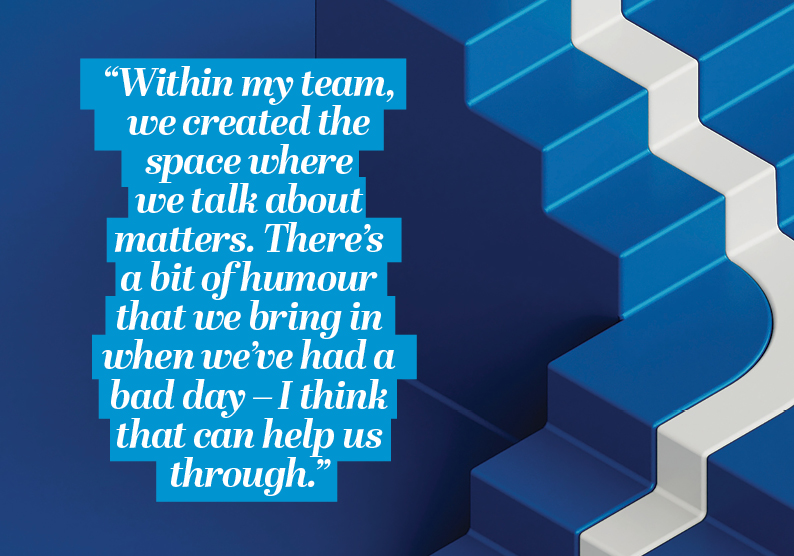
“This isn’t really just about giving,” says Murphy-Haste. “This is a two-way cultural exchange, a two-way learning experience. You are going to learn from other people, and that is the way to become a well-rounded person and a well-rounded lawyer because you need contact with clients and … people. And those soft skills of empathy and communication, AI doesn’t have yet.”
Most of the disputes are related to wills and estates and there are high rates of burial disputes within Indigenous communities. “Given the high need and Sparke Helmore’s expertise in estate law, we work closely with Legal Aid on referrals and projects”, she says. But Murphy-Haste has also observed growing demand from the so-called ‘missing middle’ those that don’t meet Legal Aid’s means test but cannot afford private representation. A 2021 Law Council of Australia paper on “Addressing the needs of the missing middle” said it applies to a broad section of the community, from older people, those in remote and rural areas, people with disabilities and mental health issues, women, single parents, LGBTQI+ people, small business owners, part-time and casual workers, people experiencing domestic violence and migrants.
The paper states that “given that certain groups are overrepresented in the missing middle, understanding their legal needs may assist in addressing the needs of the missing middle more broadly.”
There continues to be unmet legal needs for emergency response support, especially in rural areas, for small business owners, wills, estates, probate and elder abuse, particularly as older people are overrepresented in the missing middle. People might have a solid claim but find the costs of litigation too high. The paper reiterates the need to increase funding for legal assistance services, a common and recurring issue related to public funding law support. It adds that pro bono services are important but need to be concurrent with well-funded public services.
“Pro bono legal assistance services remain a primary source of support for the missing middle in Australia and have been described as the other key part of the best “legal ecosystem” and a well-funded legal assistance sector”.
There are four recommendations for pro bono support, including support for solicitors and promoting awareness of financial support practitioners can claim. But even with these measures, pro bono is not a valid replacement for “an adequately funded legal assistance sector.”
In a letter released last year, Australia’s legal bodies said, “Legal assistance services are at the frontline of some of our nation’s biggest challenges”… “[These services] are underpinned by the private legal profession, which takes on approximately 72 per cent of approved legal aid cases, despite receiving appallingly low rates of compensation for this difficult and complex work. This cannot be expected to continue.”
“Our profession is calling on all governments to significantly increase their support for Australia’s legal assistance sector,” said Law Council of Australia 2024 President Greg McIntyre SC.
“Our legal assistance sector has suffered greatly under decades of funding neglect and cannot keep up with demand for services. For example, women’s legal services in this country have reported they are having to turn away more than 50,000 women a year.”
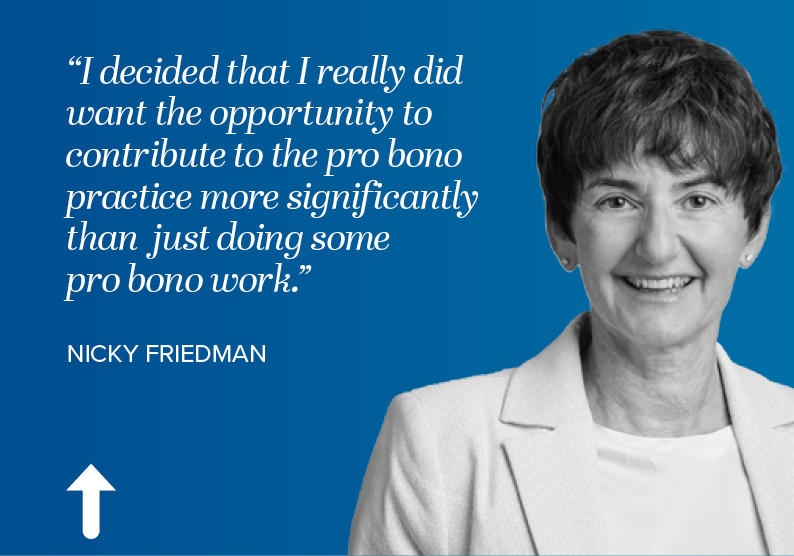
Christian-Hare also shares this concern. “For the foreseeable future, the demand for pro bono support will continue,” she says. “There is chronic underfunding of the legal assistance sector, leaving many vulnerable individuals without the legal support they need.”
The Federal Government confirmed a substantial funding boost for the 2024-25 period. However, the NLAP review also recommends extra funding for the upcoming period to address the needs of specific priority groups. The report calls for the financing to be indexed yearly to reflect growing demand and the expected price growth.
In 2007, Cate Martin was looking for her first job in the legal industry when she came across The Shopfront – a community legal centre set up by Herbert Smith Freehills and the Salvation Army, to offer legal assistance to the homeless, children and youth in need. After securing a role at the firm, Martin managed to do a six-month secondment at The Shopfront. “That was completely transformational for me,” she says. “I was in commercial litigation, working in corruption matters. [Doing this secondment] took me back to why I wanted to study law in the first place – this sense of justice and helping the most vulnerable, ensure they access justice”.
The experience was revelatory for Martin. Exposed to people dealing with trauma, substance abuse, and poverty was a humble and learning experience that, in her words, “reignited the fuel about practising law”.
She continued doing a lot of pro bono at Herbert Smith Freehills, representing some of her Shopfront clients. She was happy to continue to work for her commercial law partner if that gave her a chance to work pro bono on the side, and she felt supported by her colleagues, even when she did two secondments. Martin was left at a crossroads in her career after working for the NPY Women’s Council in Alice Springs. Would she continue in commercial law or go down a different path? “I knew I never wanted to be a commercial partner, and ultimately, I wanted to pursue a career in social justice,” she says. And that’s when a position as Asia Pacific Pro Bono director at DLA Piper appeared.
Martin also notes the impact of underfunding at Community Legal Centres. Civil and family law are two areas where demand for pro bono stands out because CLCs do not have the capacity to properly assist and tend to every request.
“[It affects] women experiencing violence … not just family, but civil and criminal as well and the complexities around all those legal issues,” says Martin. These communities face great difficulty speaking to someone about their legal woes, answering all their questions and getting the advice they need. Growing numbers of refugees, increased family reunification, and asylum requests. Additionally, Martin says the cost-of-living crisis has driven more people into financial stress. “I think even more people are seeking legal assistance than ever because of mortgage stress, financial issues [and] challenges of banking”.
The Legal Aid Means Test assesses an applicant’s eligibility to receive free or reduced financial aid. Applicants need to satisfy an income, asset and lifestyle test to be eligible. They have to be on Centrelink income support (or earn less than $450 a week), own net assessable assets worth less than $1500, and provide information about lifestyle/activities to prove they cannot afford legal costs.
Martin recalls working on a case several years ago. An older man had been scammed of almost half a million dollars, under the pretence of investing in shares. He was a recently retired teacher in his 70s and had just lost a good chunk of his superannuation on the scam. “He was honestly suicidal”, Martin says, highlighting how lost he was, unable to find advice at either Legal Aid or his local Community Legal Centre. Unfortunately, the answer to his problem was no legal recourse, but what struck Martin was the help it provided to someone experiencing a very traumatic and confusing time. “He couldn’t get compensation, he couldn’t get his money back, but he needed someone to do the analysis, to actually explain how he got scammed,” she says. When she first met him, he couldn’t comprehend how it happened; at the same time, the scammers were calling him in the middle of the night, harassing him, and he was riddled with guilt and shame for what had happened to him. “He needed a lawyer who was impartial to sensitively and respectfully explain what happened but also guide him through the process of healing and coming to terms with it,” says Martin.
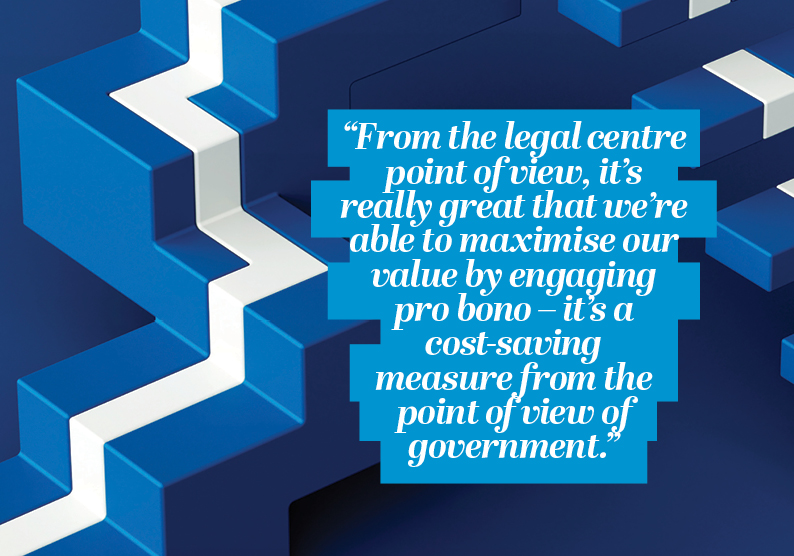
The encounter was humbling. Martin knows people might not consider it to be an extraordinary pro bono experience, but it emphasises what she finds most valuable about doing this kind of work. The outcome wasn’t the happy ending the client hoped to achieve. But for Martin, it’s a reminder of the difference it makes to someone vulnerable and in mental distress to have a solicitor support them and hold their hand.
“What that matter taught me was just about the importance of being a good person and showing empathy,” she says. “And while it wasn’t a particularly complex matter, he was so grateful for the assistance and support I provided him over a couple of months.”
Friedman brings up two cases to highlight the importance of pro bono. The first is the work that her firm did on the NZYQ case. A widely publicised and politically charged case, it led to the release of several asylum seekers from indefinite detention. It’s a touchy subject that brings up opinions from all political spectrums, but amid all the cacophony in the media, Friedman knew those were political questions. “The case was a legal case where the legal argument was made about the constitutionality of indefinite detention,” Friedman says. “The court, [not being a political organ], clarified that the law prohibited people being indefinitely detained in how they had been. That was a huge triumph for the rule of law.”
Allens’ client was a stateless individual, with no rights nor capacity to advance the case. But he had the support of a strong team of lawyers led by constitutional and administrative law expert Malcolm Stephens. “It was a team of lawyers and barristers committed to the rights of the client (…) doing the hundreds of hours of hard work without fear or favour, in a controversial area not necessarily popular with everybody, and feeling that was the right thing to do,” Friedman concludes. “I think that’s a really strong example of what assistance can achieve.”
The other case in Friedman’s mind happened more than 10 years ago. Allens represented an Indigenous client, Neville Austin, in Victoria, who was part of the Stolen Generation. “We assisted Mr Austin in bringing a claim against the Victorian Government for having wrongfully removed him from his mother’s care and then failing to restore him to her care.” It took years to prepare the claim, but the result led to a written apology from the Victorian Government to Austin and an acknowledgement that the government harmed him. The case was settled out of court per the client’s wishes. “As far I’m aware, that’s the only apology on the record from the government to a member of the stolen generation.”
Down in the nitty-gritty
Christian-Hare says the increase in pro bono hours comes down to more law firms realising the importance of being involved, as well as the benefits and growing expectations from both staff and clients.
Friedman has been in the industry for 16 years and notes this change. She observes that when she started in her role, the heads of pro bono practices from large law firms had an informal network. At the time, there were just a handful of people. “Fast-forward to now, and there’s a distribution list that some of us use from time to time to refer matters to each other—there’ll be over 100 people on that list.”
Dozens of firms created their pro bono practices and hired solicitors on the payroll to run them. According to Friedman, hundreds of solicitors work as either head of practice, as part of a team, or even in adjacent roles within corporate responsibility, like reconciliation workers, responsible for the firm’s philanthropy projects, sustainability work, or diversity and inclusion sections.
“On the one hand, there’s a brain trust to tap into; on the other hand, there’s competition for some of the work,” Friedman confesses. As it can be hard to access Legal Aid and Community Legal Centers, there’s no lack of demand for access to justice through pro bono lawyering.
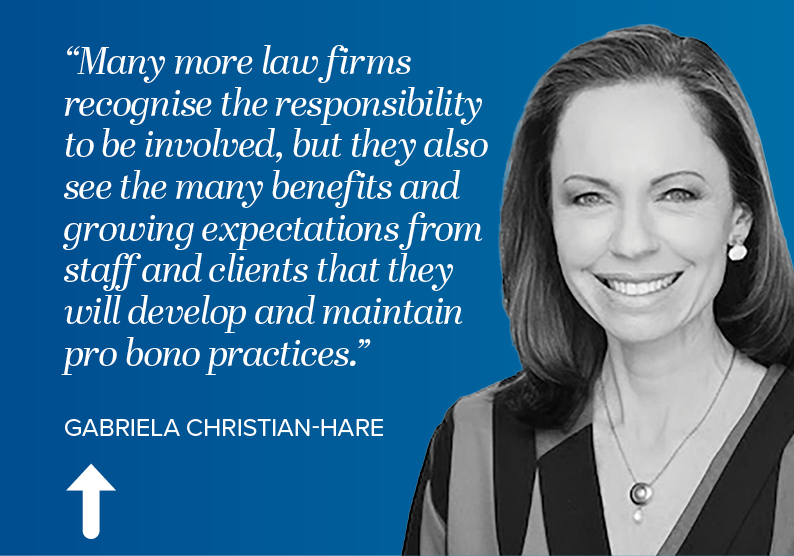
When Friedman started this role, only the Victorian Government had formal requirements for pro bono work. Over a decade later, more states and the federal government established their own requirements. “If firms want to do work for the government, quite often they’ve got a formal obligation to do pro bono work, which is perhaps why the number of firms with formal pro bono practices increased,” she says. It also helped that organisations like the Law Society of NSW and the Australian Pro Bono Centre have advocated to show firms the benefits of having a pro bono practice, both for the firm and their solicitors themselves.
But even with the number of logged pro bono hours going up, there are obstacles in the process. Friedman points at the legal funding support for Aboriginal Legal Services, support for people for whom English is not their first language, or people who are not knowledgeable in digital platforms or modern technology. “There’s such short-term funding and this leads to turnover of jobs within the Community Legal Centre sector particularly, and loss of corporate knowledge,” she says. Law firms are generally not equipped to deal with large numbers of requests or triage them to the right people. Technology helped streamline the process and bridge the gap between people who couldn’t contact solicitors before or were too remote to have fair access to justice.
Martin also points out the underfunding for Legal Aid and Community Legal Centres and the concerns that governments are looking at the pro bono firms to pick up the slack, which she deems inappropriate. But she calls for more introspection from firms, where she’s noticed lawyers who struggle to commit to their pro bono work because they are under financial pressures within the firm to meet billable targets and other extracurricular work. “I think it’s getting harder to do the pro bono work we want to do and where we know there’s legal need,” she says. “We also know that it’s getting more difficult for law firms to send secondees out to Legal Centres as well, and that’s having a flow-on effect for Community Legal Centres and their service delivery.”
Martin says the sector hasn’t grasped the question of expertise. She understands when firms pass on pro bono work because it’s in an area of law they’re not experts on. “But I also think there are ways in which lawyers can develop secondary specialisations with appropriate guidance, supervision and training, and move into areas outside their core day-to-day expertise to address these justice gaps in pro bono,” she explains.
Martin recalls her time at Herbert Smith Freehills as a commercial litigator on Friday and a criminal lawyer acting in defence matters on Monday. She admits she had support from her team to expand her expertise, and it was a steep learning curve. She wants firms to be more creative in their problem-solving to support their clients, provide training to their pro bono solicitors, and broaden the scope of services they can provide.
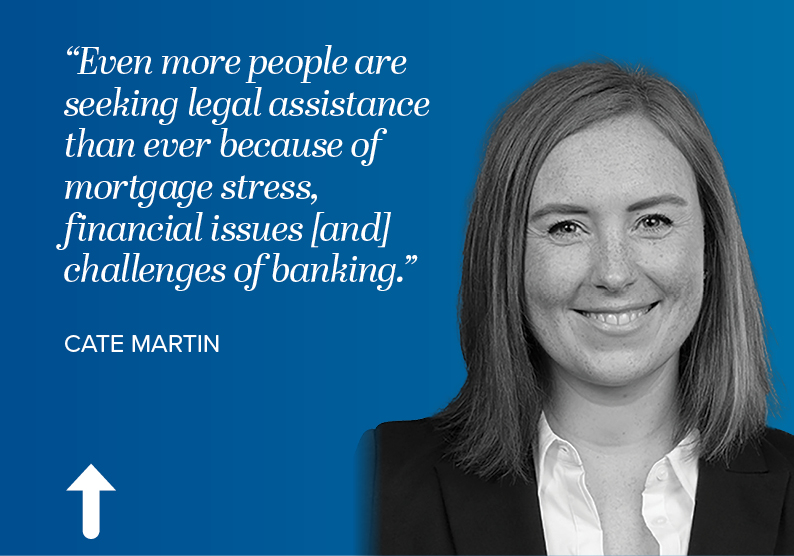
Finally, technology is an essential tool that bridges geographic and professional gaps, essential to delivering better and faster legal services. But Martin is aware that pro bono lawyers cannot only rely on tech solutions to address justice gaps. “There are going to be some people who are just too vulnerable to really engage with technology.”
Working so directly with disadvantaged people adds its own array of obstacles to the role. It’s often people dealing with trauma, mental health issues and extreme poverty, exposing solicitors to situations many may not be prepared to deal with. The Australian Pro Bono Centre addresses this, highlighting the need for extra training for lawyers working directly with clients facing trauma or challenging circumstances.
Clinics or CLCs can train solicitors to prepare them for the most adverse and challenging cases, but it also states in-house training is essential. The type of training provided depends on the nature of the service. Still, the APBC tallies six points that should generally be included in them, including strategies to use empathetic language and how to manage clients with mental complications, teach solicitors how to identify and be aware of triggering matters and teach how solicitors can react and manage problematic behaviours like aggression and threats.
“I’ve learned to deal with it over many years”, says Martin about dealing with vicarious trauma. “I personally have seen what can happen when I wasn’t coping.” She admits working at Shopfront was challenging, especially as some support tools weren’t available. Nowadays, support tends to be more proactive. Martin tells how her current firm organised a vicarious trauma masterclass with an external psychologist to support the team and talk about their concerns and strategies to manage trauma. “Within my team, we created the space where we talk about matters”, she explains. “[T]here’s a bit of humour that we bring in when we’ve had a bad day – I think that can help us through.” Pro bono practices tend to be aware of the effects of vicarious trauma on their personnel and extend that to their colleagues in commercial practice when involved in pro bono matters.
“Look, you may encounter something confronting and challenging. You may feel a bit off,” she says. “So we identify that upfront to give our team the tools to manage it. And if they’re out of their depth and need external support, we give that word where that’s needed”.
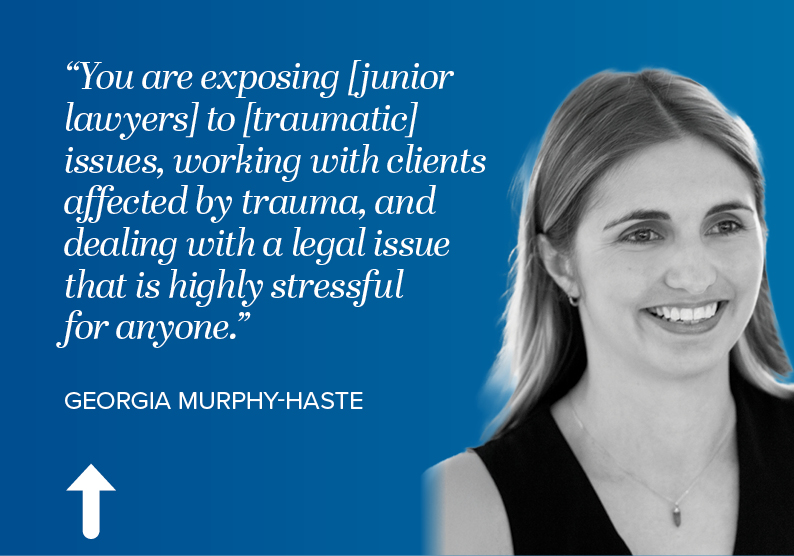
Murphy-Haste also notes investment in support for vicarious trauma training and trauma-informed practice training. She points out that many people interested in pro bono are junior lawyers and recent graduates. “You are exposing them to [traumatic] issues, working with clients affected by trauma, and dealing with a legal issue that is highly stressful for anyone,” she says. The Australian Pro Bono Centre offers support resources to solicitors affected by vicarious trauma, and the Law Society’s Solicitor Outreach Service is available 24/7 on 1800 592 296 for counselling.
“I think that’s what makes working in pro bono an interesting role because it’s not purely legal; it’s quasi-legal,” says Murphy-Haste. “You are connecting with lawyers. That point of contact is where, if something distressing happens to them, they contact you, and you provide advice on how to deal with that and work with distressed clients. And then you’re also in a management role”.
Tips for working with private firms
“From the legal centre point of view, it’s really great that we’re able to maximise our value by engaging pro bono – it’s a cost-saving measure from the point of view of government,” says Katie Green, CEO of the Inner City Legal Centre. “But we also feel that encouraging pro bono to take on that work keeps the private sector alert to important social justice issues.”
Green sees legal centres as playing a critical role in keeping the legal problems of everyday people on the agenda. “So the law isn’t just used as a tool for making profit or protecting the interests of large corporations and the ultra-wealthy.”
She admits that the centre’s location, in the heart of Darlinghurst, helps it access more firms that support them when rural, regional, and remote legal centres struggle to get more exposure. However, the question of funding still prevails. Green concedes they lack funding infrastructure to cover the costs of secondment. They receive requests for secondments from both junior lawyers and experienced lawyers, a mixture of skills and talents from different training backgrounds, but at the moment, they can’t accommodate every request.
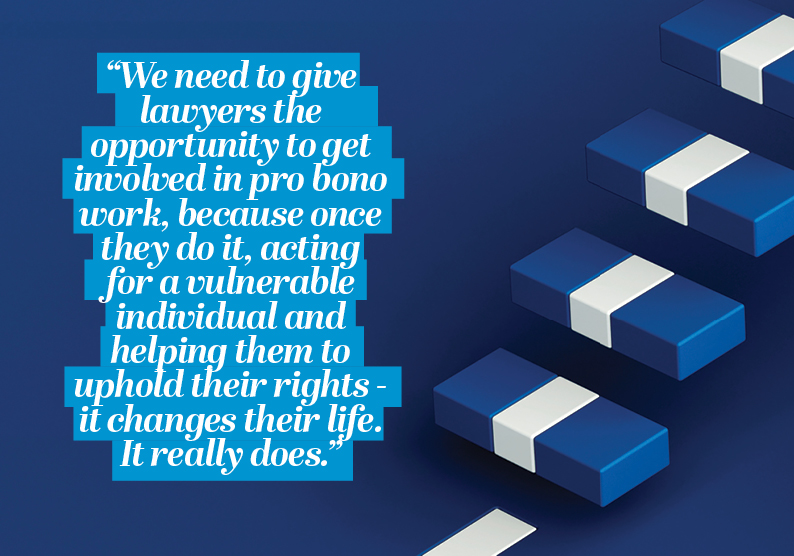
CLCs can work at a fast pace, especially compared with private law firms. There’s a high volume of clients looking for advice. Green says they provide roughly 30 to 50 legal advice appointments a week, each lasting less than an hour, so people can be referred to the right place. Their relationship with pro bono partners is healthy, but she’s noticed the centre’s fast pace often contrasts with a partner’s slower processes. “When we contact a pro bono partner, there’s often quite a thorough and long process on the other end to assess whether or not they’re going to take the matter,” she explains. “So, we might often prepare a summary of the case and the issue, email our partner, and then there might be two-three weeks process where they are assessing the matter.” Green understands private firms have their own challenges, but she sees this as a key obstacle – clients seeking assistance who have their requests rejected after several weeks. Knowing how long a decision might take, would help. “Because it’s never a problem if one pro bono partner can’t accept a referral,” she says. “But in order to deliver the best service that we can, we want to be able to direct them to our next partner.”
Taking that last step
“We are members of the closed profession. It’s a real privilege to have a law degree,” says Friedman when asked what she would tell a solicitor to convince them to do more pro bono work. “Everybody needs legal work, and only some people can get it. If you’re lucky enough to be a provider of legal services, then I think some of that without expecting financial compensation is the ethical thing to do.”
Cate Martin adds that it’s her pro bono that often leaves the most lasting impressions. “I’ve heard from partners that say to me, you know ‘Cate, it was that pro bono matter you sent me last year that I went home and told my families about – I don’t tell my kids about my commercial practice, It’s the pro bono matters I’ve done that I’m so proud to go home and talk to them at dinner time’.”
“That’s a reminder to me about the power of pro bono because … it’s about helping another person – there’s nothing more to it. [I] think we need to give lawyers the opportunity to get involved in pro bono work, because in my experience, once they do it, acting for a vulnerable individual and helping them to uphold their rights, to advocate for themselves, to seek a sense of justice, it changes their life. It really does.”




